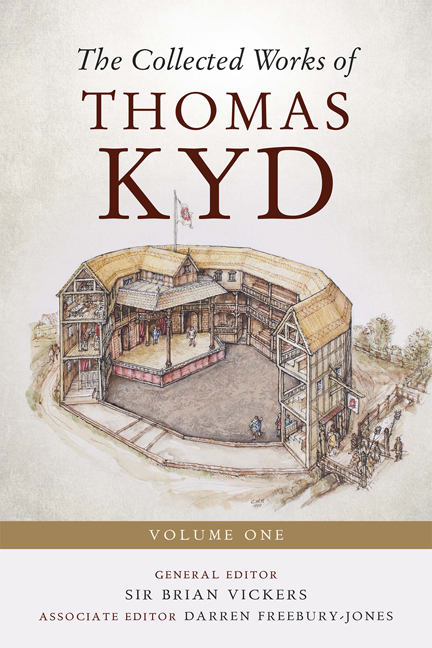Kyd and the London Theatre
Published online by Cambridge University Press: 16 May 2024
Summary
As with many other Elizabethan writers, we know little about Thomas Kyd's life. On 6 November 1558, the parish register of St Mary Woolnoth recorded the baptism of ‘Thomas, son of Francis Kidd, Citizen and Writer of the Courte Letter of London’. Kyd's father, Francis, rose to be Warden of the Company of Scriveners in 1580, the official body supervising ‘a profitable and ancient trade’. Scriveners, officially known as ‘Writers of the Court Letter’, enjoyed ‘a monopoly on engrossing charters, contracts, testaments, and official documents’, functioning ‘not only as notaries and copyists, but also as money lenders’. The need for verbal accuracy in their profession made them insist that a scrivener's apprentice acquire a perfect knowledge of Latin grammar and be ‘erudite in the books of genders, declensions, preterites and supines’. Francis Kyd had evidently had a grammar school education and ensured that his son had the same good start in life. Thomas must have received his first education at home, for when he entered the nearby Merchant Taylors’ School on 26 October 1565, just before his seventh birthday, he was expected ‘to know “the catechysm in English or Latyn” and be able to “read perfectly and write competently”’.
The curriculum of Merchant Taylors’ envisaged six to eight years’ intensive study of Latin grammar, as codified in the official ‘King's grammar’ of John Lily, reading a graded sequence of Latin authors (Cato, Terence, Virgil, Cicero's Letters, Sallust, Caesar, Horace's Epistles, Ovid's Metamorphoses and Fasti), and regularly composing Latin prose and verse, incorporating the figures of rhetoric. Although limited to Latin, the drilling in grammar, rhetoric, and classical prosody was so intense that it could hardly be matched in any modern university. Kyd published his Latin verse in his earliest work, Verses of Prayse and Joye (1586), celebrating Queen Elizabeth's escape from the Babington plot. The Spanish Tragedy includes several passages of Latin verse that Kyd wrote and also adapted to frame his quotations from classical Roman poets.
In addition to a thorough acquisition of Latin, Kyd may have owed to Merchant Taylors’ School his first exposure to drama. The headmaster Richard Mulcaster had been educated at Eton under Nicholas Udall, who had combined two Latin comedies (Plautus's Miles Gloriosus and Terence's Eunuchus) for his Ralph Roister Doister, the first English classical comedy (1567).
- Type
- Chapter
- Information
- The Collected Works of Thomas Kyd , pp. 1 - 38Publisher: Boydell & BrewerPrint publication year: 2024



